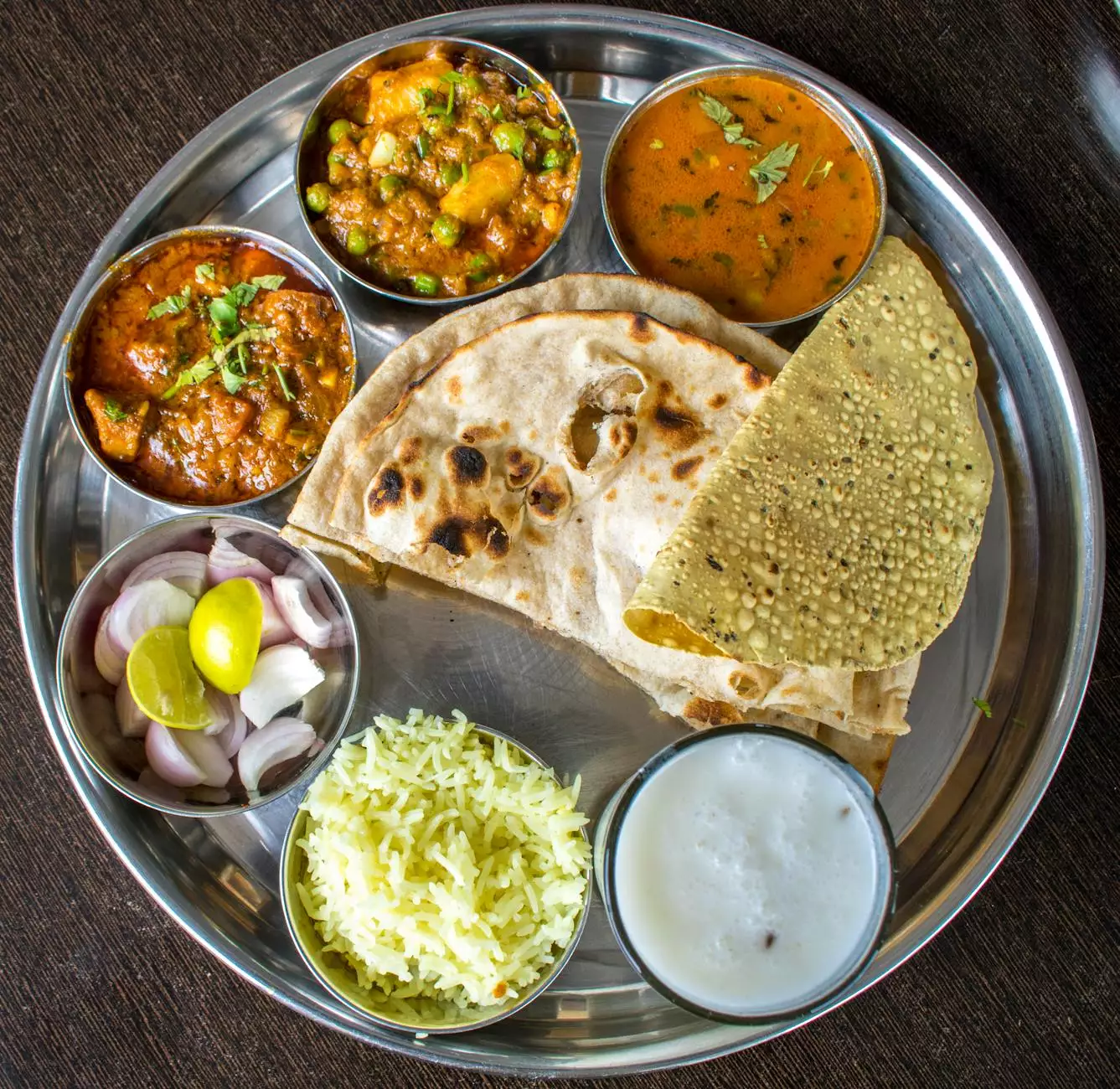The Essence of Thali in Indian Culture

The word "thali" (थाली) holds a special place in the heart of Indian culture. This term, primarily rooted in Hindi and Punjabi, encompasses a variety of meanings, from a simple plate to a rich culinary experience. In this article, we will explore how thali signifies more than just a serving platter; it represents the rich tapestry of Indian cuisine, traditions, and spirituality.
Understanding Thali: More Than Just a Plate
In India, the concept of a thali extends far beyond a mere physical object. While it does refer to a plate, often made of stainless steel or traditionally crafted from brass or copper, it also refers to a complete meal served in a way that reflects the culture's emphasis on diversity and balance. Let’s explore different facets of a thali:
- 1. Thali as Serving Platter: The physical component where various dishes are served together.
- 2. Thali as a Meal: A representation of numerous dishes that create a balanced diet.
- 3. Spiritual Significance: In many cultures, sharing food from a communal platter promotes unity and togetherness.
The Components of a Traditional Indian Thali
A traditional Indian thali typically includes an assortment of dishes that provide a complete culinary experience. Here are the standard components you can expect to find:
1. Roti or Rice
At the base of most thalis are carbohydrates such as roti (Indian bread) or rice. They serve as essential filler items that complement the richness of the accompanying dishes.
2. Dal (Lentils)
A staple in many Indian households, dal is a source of protein and is flavorful, typically seasoned with spices, and sometimes garnished with ghee.
3. Sabzi (Vegetables)
Assorted vegetable dishes, known as sabzi, provide a range of colors, textures, and flavors. Popular choices include aloo gobi (potato and cauliflower) and palak paneer (spinach with cheese).
4. Pickles and Chutneys
To enhance the meal, various pickles and chutneys bring in tangy flavors, adding a distinctive twist to each bite.
5. Curd or Raita
An essential component, curd or raita (a yogurt-based dish) acts as a cooling agent against spicy flavors and aids in digestion.
6. Sweets and Desserts
No thali is complete without a hint of sweetness. Desserts such as gulab jamun or kheer often conclude the meal on a delightful note.
Regional Variations of Thali
Throughout India, the composition of a thali can vary significantly based on the region, showcasing the vast diversity of Indian cuisine:
1. Rajasthani Thali
Known for its rich flavors, a Rajasthani thali often includes dal baati churma, gatte ki sabzi, and various regional sweet dishes. It's a feast of vibrant spices and traditional cooking methods.
2. South Indian Thali
A typical South Indian thali features steamed rice served with sambar, rasam, and a variety of curries and accompaniments, creating a balanced and satisfying meal.
3. Maharashtrian Thali
The Maharashtrian thali commonly includes puran poli, misal, and a range of local specialties, rich in flavor with an emphasis on spices and legumes.
Thali: A Symbol of Heritage and Togetherness
Beyond serving as a meal placement, the thali holds significant cultural importance in India. It symbolizes hospitality, as guests are often welcomed with an elaborate feast laid out on a thali. The act of serving and sharing food from a thali fosters a sense of community and brings loved ones together, making it an integral part of social gatherings.
The Spiritual Connection of Thali in Rituals
The concept of a thali is not only confined to meals; it also extends into spiritual practices. In many Hindu rituals, a specially prepared thali is used during pooja ceremonies. Components of a pooja thali may include:
- Diya: A small oil lamp representing light and goodness.
- Fruits and Flowers: Offerings to deities symbolizing beauty and abundance.
- Incense sticks: Used for purification and to invoke the presence of divine energy.
These elements create a sacred environment that enhances worship and devotion, demonstrating the deep connection between food, culture, and spirituality.
Promoting a Thali-Inspired Lifestyle at Ompooja Shop
At Ompooja Shop, we recognize the significance of thali in both culinary and spiritual contexts. We offer a variety of products that celebrate this cultural symbol, from traditional thali sets to spiritual items for your rituals. Here’s how you can integrate the essence of thali into your life:
- Explore Authentic Indian Cuisine: Discover our range of ingredients to prepare your own traditional thali at home.
- Create Your Spiritual Space: Use our collection of pooja thalis and spiritual items to enhance your rituals and daily practices.
- Host Gathering with Friends and Family: Embrace the spirit of sharing by hosting a thali night, introducing loved ones to the joys of Indian cuisine.
Conclusion: Embracing the Thali Experience
In conclusion, the word thali encapsulates the richness of Indian culture, lifestyle, and tradition, transcending its basic definition. Whether you are savoring a delicious meal with family or participating in spiritual rituals, a thali binds individuals and fosters a sense of community and belonging. As we endeavor to celebrate this concept, let us continue to embrace the diverse flavors and spiritual significance that it brings to our lives.
Explore our offerings at Ompooja Shop and embark on an enriching journey inspired by the legendary thali.



